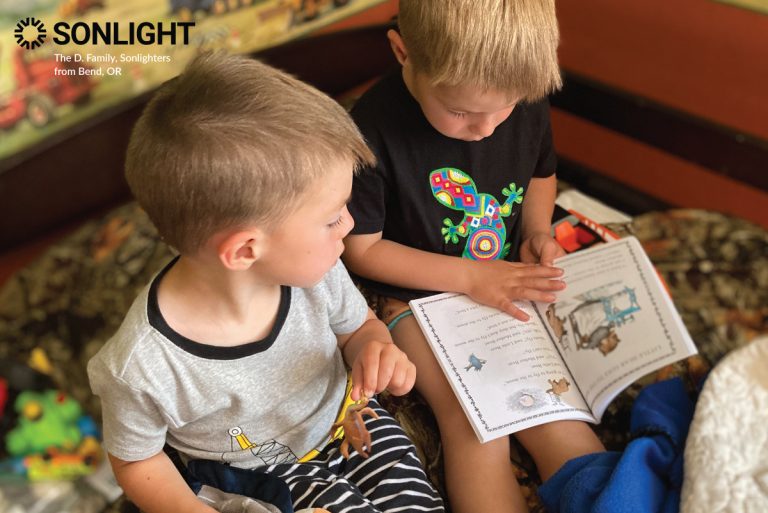This retort was my mental refrain anytime I encountered someone who homeschooled their children: I don't have the patience to homeschool. I loved the idea of homeschooling, but just knew that I lacked the tolerance to spend all day, every day shepherding my young children through reading, writing, and arithmetic.
Enter COVID. Like so many others, we decided to try homeschooling after a failed attempt at virtual learning last spring. I knew in my heart that home education might be the best option for our family, but I wondered how I would juggle teaching and parenting without losing my cool daily. I figured that patience was a virtue. Some are born with it, and some…well, some of us are not.
We have certainly had our ups and downs this year, and I have relied heavily on the wisdom of other homeschooling moms who shared their experience so feely. What I’ve heard over and over is that very few of them felt naturally endowed with an excess of patience and tolerance. Instead, they embraced homeschooling as an opportunity to develop patience, all in the service of strengthening their relationship with their children.
So, how did they do it? Here is a breakdown of five practical tips I’ve picked up over the last few months for cultivating patience and diffusing tension during the homeschool day.
1. Start Your Day Over
We all have bad days, and things can snowball out of control rapidly. During a phone conversation with a friend on one of those bad days, she suggested that we all (myself and my children) count to three and start our day over.
Although starting over seemed like a laughably simple solution, it worked!
Now, when I feel myself tensing up, or see my kids getting overwhelmed with frustration, I know what to do:
- acknowledge the situation
- take a deep breath
- count 1—2—3
- start the day or the lesson over
2. Relinquish Control
So many times, my tension and irritation originate from clinging too tightly to my agenda for the day. One of the benefits of homeschooling is that we have the freedom to follow learning’s natural ebb and flow, chase down rabbit holes, and focus on the educational opportunities that present themselves.
I have found that when I am able to let go even just a little bit of my bright ideas and follow my children’s lead, it goes a long way toward increasing our peace and joy in learning, and my patience with my children
3. Pray
Although it is a goal of mine to start each day with prayer, it’s also an invaluable tool throughout the day. When agitated, I try to pause and ask God for help in the moment. I ask him to help me do my best and to remind me that my little ones are doing their best, too. This is not novel advice, but for some reason it’s so hard to remember when we’re in the thick of things!
Even a simple prayer will do: “God, please help me to be patient with these little souls in front of me” or “God, please help all of us to do your will today.”
4. Manage Expectations
We call it the witching hour at our house. You might have another colorful name for it. But, each day, around 4:30-5:00 pm the wheels seem to come off the wagon around here. We’ve all had a long day by then, nerves are a bit frayed, and our coping skills are nearly exhausted.
I have come to dread this time of day, steeling myself for tantrums and meltdowns as I try to prepare dinner, help our older boys with schoolwork, and keep my younger ones engaged in some type of activity. I tend to shift quickly into reactive mode, bustling around trying to get this child to quiet down, this one to focus, this one to leave me alone so I can just “do this one thing!”
Not surprisingly, these afternoons often end in tears for at least one of us, sometimes all of us!
Eventually, it dawned on me that I get frustrated and flummoxed every day by something that should be completely expected and predictable.
My children are just doing what children do when they get tired and bored. I can keep snapping and picking at them, which isn’t working too well, or I can accept things as they are and do my part to alleviate our stress.
I started by making time to read aloud in the afternoons, an activity we all enjoy that promotes closeness and camaraderie. After having some dedicated time with me as reader, my young children were much more content with independent playtime while I made dinner or helped our older boys. Whenever possible, I tried to celebrate the little ones’ attempts to help me make dinner by enlisting them in setting the table, folding napkins, or getting out the utensils. Again, it comes back to expectations. It probably wasn’t too realistic of me to expect some quiet time to myself at this time of day. So, instead of shooing everyone out of the kitchen, I now try to involve them in cooking and other simple chores whenever possible. Recalibrating my expectations for this particular part of our day has increased my patience with myself and my family.
5. Practice Self-care
We’ve all heard the spiel on the airplane to first place the oxygen masks on ourselves, and then assist our small children. If I am frazzled, depleted, or stressed out, I will have nothing left to give my children.
As an introvert, I need a bit of quiet time each day. But since I feel guilty scheduling this time or setting boundaries with my children, I never get the time alone I crave. I have thankfully learned from the experience of others that it is perfectly okay to plan a daily quiet time for myself and for my children.
Once I have taken that time to recharge, I am then much better equipped to engage with my children and respond to them in a loving and patient way.
While I don’t put all of these suggestions into practice every day, I am content with progress, not perfection. I have learned that it doesn’t really matter how much patience I have, but rather how much I’m willing ask for more and reach for one of these solutions when I find myself falling short. COVID gave me the push I needed to try homeschooling, and the wisdom of homeschooling moms before me has given me the tools I need to enjoy this journey with my children.









